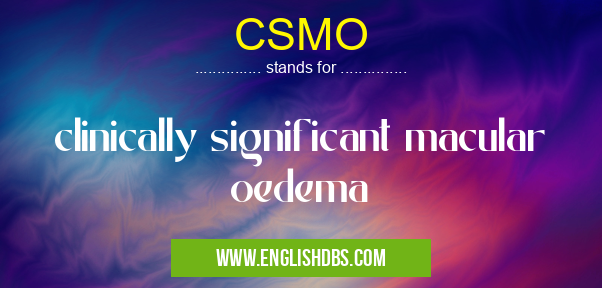What does CSMO mean in UNCLASSIFIED
Clinically Significant Macular Oedema (CSMO) is a condition of swelling of the macula, which is the central area of the retina responsible for fine vision. This condition can potentially lead to a significant deterioration in vision, so it important for patients to be aware of the symptoms and treatment options that are available. In this article, we will discuss what CSMO is, why it occurs, and what treatments are available for those who have been diagnosed with it.

CSMO meaning in Unclassified in Miscellaneous
CSMO mostly used in an acronym Unclassified in Category Miscellaneous that means clinically significant macular oedema
Shorthand: CSMO,
Full Form: clinically significant macular oedema
For more information of "clinically significant macular oedema", see the section below.
What Is CSMO?
CSMO is an eye condition in which fluid accumulates in the macula region of the retina. It is caused by damage to the blood vessels and capillaries that supply nutrients to this area of the eye. As a result, these blood vessels become leaky and fluid will accumulate around them. This causes tissue in the macula to swell up, resulting in blurry or distorted vision. It typically affects people over 40 years old and usually affects only one eye.
Symptoms Of CSMO
The main symptom associated with CSMO is blurred or distorted vision, but other signs may include reduced color perception and difficulty reading small print or focusing on distant objects. If left untreated, CSMO can lead to permanent visual loss and even blindness in one or both eyes.
Causes Of CSMO
There are several possible causes of CSMO including diabetes mellitus, glaucoma, uveitis, hypertension (high blood pressure), retinal vein occlusion (RVO), age-related macular degeneration (AMD), vascular diseases such as atherosclerosis and cholesterol deposits that disrupt oxygen exchange at the level of blood vessels supplying oxygen to the retina. Additionally sometimes radiation therapy for certain types of cancer can also cause CSMO due to damage done to nearby tissue.
Treatment Options For Those With CSMO
Treatment for those diagnosed with clinically significant macular oedema depends on its cause but generally includes laser therapy that reduces leakage from damaged blood vessels beneath the retina's surface as well as medications such as corticosteroids or anti-VEGF injections which help reduce inflammation levels associated with certain types of retinopathy caused by conditions such as diabetic retinopathy or AMD. Some cases may require surgery depending on severity and risk factors associated with particular individuals affected by this condition.
Essential Questions and Answers on clinically significant macular oedema in "MISCELLANEOUS»UNFILED"
What is clinically significant macular oedema?
Clinically significant macular oedema (CSMO) is a condition in which the center part of the retina (known as the macula) swells due to fluid accumulation. It can cause permanent vision loss if left untreated.
What are some of the risk factors for CSMO?
Risk factors for CSMO include diabetes, high blood pressure, age-related macular degeneration, and exposure to certain medications or diseases.
How do I know if I have CSMO?
You may not experience any symptoms of CSMO initially. That's why regular eye exams are important - your doctor can detect early signs of disease or changes in your vision that may indicate CSMO. If present, symptoms can include blurred vision, difficulty reading or focusing on objects, color distortion and/or straight lines appearing wavy.
Can CSMO be treated?
Yes. Depending on the severity of your case, treatment options such as laser therapy or medication can help reduce swelling and improve vision. In some cases, surgery may be recommended to help reduce fluid leakage from nearby vessels or stop new vessels from forming on the retina.
What lifestyle changes should I make if I have been diagnosed with CSMO?
If you’ve been diagnosed with CSMO it is important to maintain healthy habits such as regularly exercising and eating a balanced diet to prevent further complications or retinopathy development. Additionally, it’s important to quit smoking and limit exposure to UV light when possible by wearing sunglasses outdoors when necessary. Following up with your doctor for regular checkups and staying compliant with medications is also important in helping keep your condition under control.
What activities should be avoided if I have been diagnosed with CSMO?
Activities such as reading small print in low light settings which puts strain on the eyes should be avoided if you’ve been diagnosed with CSMO., High impact sports such as boxing and contact sports should also be avoided due to risk of head trauma which may worsen vision difficulties associated with this condition.
